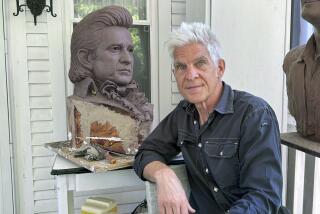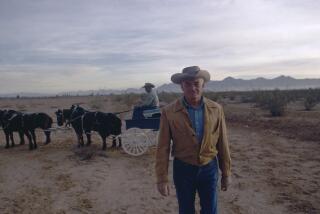COLUMN ONE : Arkansas’ Image Is on the Line : Long caricatured as hopelessly backward, the state finds redemption in the election of Bill Clinton. But is this place really on the road to pop chic?
- Share via
LITTLE ROCK — “Arkansas,” said a traveler lost there in the last century, “is not a part of the world for which Jesus Christ died.”
Given the conditions of the time and what presumably were the dire circumstances of the unnamed visitor, that harsh judgment would have been hard to dispute.
To westward-bound emigrants, the swampy, mosquito-infested, outlaw-ridden territory just beyond the Mississippi was to be entered with dread. It was a terrible place, where one profoundly hoped merely to survive without permanent impairment of health or loss of limb.
Long after statehood in 1836, it continued to be wracked by blood feuds and rampant lawlessness, earning a reputation as an extraordinarily rough place even on the frontier. It wasn’t just the outlaws who were wild: One debate in an early session of the state Legislature ended with the Speaker of the House stabbing a political adversary with a Bowie knife.
Against such a backdrop, it is not surprising that the ascension of one of Arkansas’ native sons to the White House has filled the nation with curiosity--and many of the state’s present-day citizens with a mixture of high expectations and anxiety.
Every President brings his home state--its culture, customs, history and folkways--into the national spotlight. And at least something from a new President’s roots usually rubs off on the popular culture, especially in the Capital itself. Lyndon B. Johnson spurred a taste for cowboy boots, chuck-wagon cuisine and ranching. Jimmy Carter brought to Washington the feel of the small-town, rural South with its Pond House picnics, Sunday school and softball games. Both George Bush and John F. Kennedy reminded the country of the bracing pleasures of New England’s rock-bound coast.
Exactly how much of Arkansas’ culture and traditions William Jefferson Clinton will bring to Washington remains to be seen. But whatever Arkansas’ effect on the nation, one thing is clear: From the Mississippi delta to the Ozark Highlands, Clinton’s election to the White House is looked upon as a redemption of the state and its reputation.
On the morning after the election, the editorial page of the Arkansas Democrat Gazette, reflected the state’s deep sensitivity about slights, large and small.
“The talking heads in their sealed-off rooms still can’t tell one Arkansas choir from another, they aren’t quite sure what time zone this state is in, and they may not be able to get the name of its newspaper right, but they soon will, they will,” said the lead editorial.
“Power attracts attention to all its surroundings,” the paper continued. “After all those years of being dismally Out, Arkansas is headily In. Thank you, Bill Clinton.”
But the road to pop chic has been a long and tortured one and recasting the state’s image and the confidence of its populace could be a mighty task, even for the likes of the President-elect.
“The exaggerated interest in Arkansas’ image has lost none of its piquancy in a century and a half,” said Bob Lancaster, who has deftly analyzed his state’s history and psyche in his book, “The Jungles of Arkansas.”
“There’s seldom been a time when Arkansas people weren’t finding a new reason to be embarrassed about what people outside the state might be thinking of them,” he said.
First, the image was one of a wilderness on the way to Texas. Later, it was caricatured as a province inhabited by barefoot, hookworm-infected, illiterate hillbillies. In its sometimes turbulent modern era, it has been held up as just generally and hopelessly backward.
The latter impression has been abetted by comic strips such as L’il Abner and Snuffy Smith, as it was for years by the old Lum and Abner radio show, broadcasting the musings and cracker barrel philosophy of the idlers who lolled about a fictional Jot ‘Em Down Store at Pine Ridge, Ark.
Critics from Mark Twain, who labeled the state’s inhabitants “lunkheads,” to H. L. Menken, who called the Ozarks “one of the great moron reservoirs in the United States,” to 1950s columnist Dorothy Kilgallen, who suggested that Arkansans were ineducable, have found the state an irresistible target.
At the Republican National Convention last summer, Marilyn Quayle clucked that the rest of the country wouldn’t want to look like Arkansas, and in the last days of the presidential campaign, George Bush infuriated the state by repeatedly insinuating that Arkansas is “the lowest of the low.” Ross Perot chimed in with the suggestion that Arkansas’ main business is plucking chickens.
In some places, this kind of scatter-gun invective would be shrugged off, but not in Arkansas. It’s been heard for too long.
The state has tried for decades to tidy up the image. It has tried slogans: “The Wonder State,” “The Natural State” and “The Land of Opportunity.” Most of its people have even taken to calling themselves Arkansans, a term that seems more modern than Arkansawyers, which is still preferred by a lot of old timers.
In truth, both the Arkansawyers and the Arkansans have contributed to their image problems, and they have worn their sensitivities on their sleeves. Over the years, their sensitivity has only served to make them the butt of more jokes that they might have easily brushed aside.
Theirs is (so far) the only state to have defaulted on its debts three times, most recently in the Great Depression. Theirs is the state--need it be mentioned?--that required the assistance of U.S. Army paratroopers to desegregate Little Rock’s Central High School.
Stereotypes thus reinforced have not only defied public relations campaigns but survived in spite of modern political figures who preceded Bill Clinton to the national stage--Sen. J. William Fulbright, the President-elect’s mentor and hero; Sen. John L. McClellan, a bulldog of an organized crime investigator; Rep. Brooks Hays, a respected moderate during the civil rights struggle; Senate Majority Leader Joseph T. Robinson, who was Al Smith’s running mate on the 1928 Democratic ticket, and Hattie Wyatt Caraway, who in 1931 became the first woman elected to the Senate.
The late Rep. Wilbur Mills, as chairman of the House Ways and Means Committee, was as powerful as any of them, but his career ended spectacularly and prematurely when he and a stripper named Fanne Foxe drove his auto into the Washington tidal basin near the Jefferson Memorial, and he subsequently confessed that he had become a drunk.
It is easily understandable, said Ernest Dumas, a professor at Central Arkansas University, that there is still this “excessive self-consciousness, this feeling of inferiority, or at least a feeling that the rest of the country thinks we are inferior.”
But that was B.B.C: Before Bill Clinton. Hopes are high that a cultural corner has been turned.
The governor’s election to the White House has been occasion for the media to plumb his cultural underpinnings and re-explore his native state and its folkways.
Roy Reed, who quit city life and the staff of the New York Times to farm at Hogeye, Ark., and teach at the University of Arkansas, can already see how it is going to play out. “We are going to be in for about a year of Bubba stories,” he said, “and then we’ll have reporters all over the place doing the revisionist angle, that Arkansas isn’t a bad place after all. Then, we’ll realize that we would have been better off with the Bubba stories because we will have people coming in from everywhere and causing overcrowding. We’ve got too many coming in now, especially in the Ozarks.”
In Washington, sixteen years after Carter’s election, the question is whether the Capital is about to see an Arky invasion comparable to the Georgia governor’s arrival with a Dixie legion that amused, irritated and beguiled the capital. Clinton’s friends, as well as Arkansans and Arkansawyers who have observed him from a distance, think not.
They have good reasons. Clinton, like Vice President-elect Al Gore, is as much a creature of the eastern Democratic Establishment as he is a product of Southern politics.
“My guess,” said Dumas of Central Arkansas University, “is that the Clinton Administration will have far less of a regional flavor than either the Johnson or Carter Administration.
“Although he has spent most of his life here, he has developed an almost international set of connections over years,” he said.
Arkansas’ imprint on Washington will be less conspicuous than the Texas brand of the Johnson years or the Deep South style evident in Carter’s term because of the state itself. The state has little of the legendary Texas narcissism, nor does it fall into the stereotyped mold of the Deep South.
On the west side of the state, Arkansans and Arkansawyers wear Western boots, not as an affectation, but because that is the accepted footwear. They also eat barbecued beef, a habit that distinguishes and estranges them from Easterners who confine themselves to barbecuing pork.
The Ozark region in the northwest, from whence sprang Snuffy Smith with his hound dog, long rifle and “likker” jug, is a rustically beautiful and remote land unto itself, more akin to the Ozarks of Missouri than to the valleys down toward Little Rock.
Like Clinton, who launched his political career in the Ozark capital of Fayetteville after a childhood in the hamlet of Hope and adolescence in Hot Springs, the state has been changed by faraway influences.
“Listen to the voices on the University of Arkansas campus, and you would never guess you are in a Southern state,” said Roy Reed. “Even Arkansas kids are beginning to talk like they are from somewhere else. Little Rock kids sound like people from New England.”
Clinton, Reed suspects, was subjected to influences far from Arkansas even when he was growing up in Hot Springs, the spa southwest of Little Rock where tourists come for hot baths, horse racing and in times past, gambling.
“Take Clinton and the saxophone,” said Reed. “Now that’s a Hot Springs thing. I grew up in South Hot Springs, in Baptist territory, where we didn’t believe in drinking and dancing and night clubbing.
“But Clinton came from that other part of town that’s kind of an extension of Chicago, where the good-time folks lived, the horse racing and saxophone section of town.” Among the first of Bill Clinton’s friends to begin planning a trip to Washington as the governor’s election became apparent Nov. 3 was George Eldridge.
He was not looking for a political job. He was looking for a place to open a restaurant to serve catfish and steaks the size of which Washington has not seen since cholesterol became an issue.
For several years, Eldridge and his partner, Louise Robinson, have run a down-home Little Rock restaurant called Doe’s. It is regularly patronized not only by Clinton, who favors its steaks and cheeseburgers, but by most of his Cabinet and the state Legislature--and lately campaign advisers and hordes from the news media.
The menu will be expanded for Washington, but the aim is to take a little of Little Rock within a walk of the White House.
The new President’s friends from western Arkansas will not be surprised to hear that barbecued beef will not be offered. The ribs will be pork.
On that matter, Eldridge stands with the people Carter brought from Georgia. While the folks who stay home, with their inferiority complexes soothed by Clinton’s success, will not presume to give their native son premature advice on running his Administration, there are matters on which they consider themselves expert.
They would like the White House chefs to stop sugaring the corn bread. (The difference on that matter, some Arkansawyers say, was a contributing factor in the outbreak of the Civil War.) Arkansawyers also will now insist that Northerners accept that purple-hulled peas and whippoorwill peas are not inherently inferior to English peas.
And they would appreciate some tolerance of their custom of drinking iced tea in winter.
More to Read
Sign up for Essential California
The most important California stories and recommendations in your inbox every morning.
You may occasionally receive promotional content from the Los Angeles Times.












